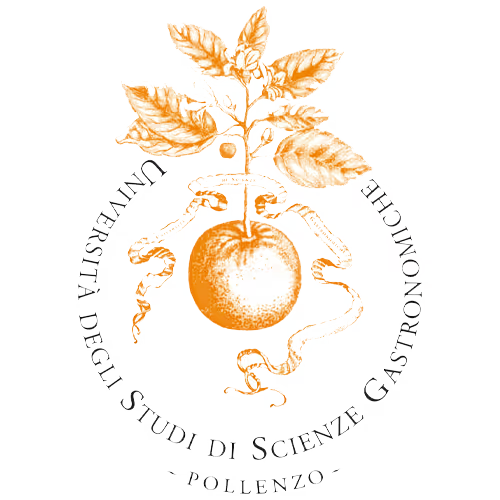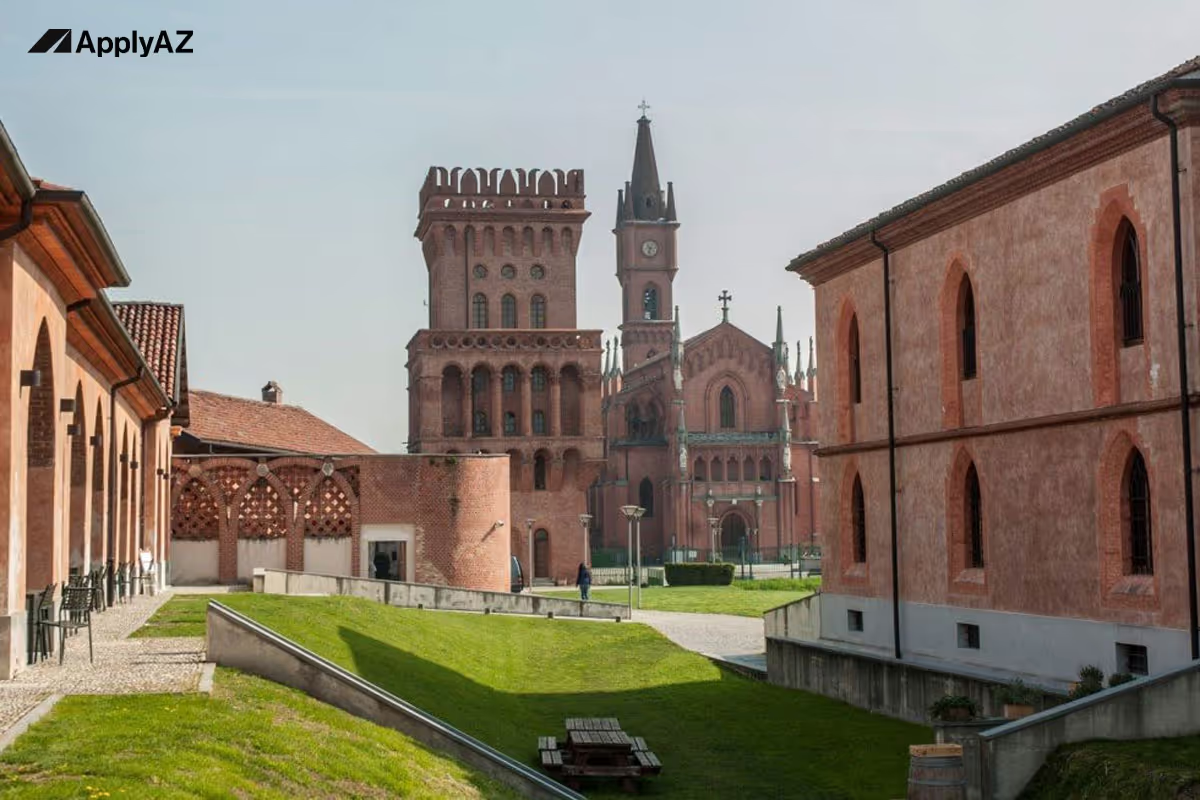Heading
Heading








Study in Italy in English: University of Gastronomic Sciences (Università degli Studi di Scienze Gastronomiche)
Study in Italy in English at the University of Gastronomic Sciences, a food-focused campus offering English-taught programs in Italy, DSU grant funding, and strong industry links.
International students who search for English-taught programs in Italy often picture busy cities and large classes. Yet you can study in Italy in English on a royal estate, taste heritage cheeses during lessons, and still claim scholarships normally reserved for bigger public campuses. The University of Gastronomic Sciences (Università degli Studi di Scienze Gastronomiche) in Pollenzo does exactly that. Founded by the Slow Food movement, it trains a new kind of food leader who balances pleasure, profit, and planet. Below, ApplyAZ explains the university story, campus life, funding routes, and career doors—so you can decide if this is your perfect recipe for growth.
A Young University with Global Reach
UNISG opened in 2004 when Slow Food, the Piedmont Region, and the Italian government teamed up to create the world’s first university devoted only to food studies. Despite its youth, it already appears in top-50 global hospitality tables and sends graduates to work in more than 90 countries.
Teaching mission
- Combine natural sciences, social sciences, and business to address food challenges.
- Use “study journeys” instead of long lectures; you meet producers in Italy, Kenya, or Japan.
- Keep classes small—often fewer than 35 students—so teachers can mentor each project.
Key departments
- Gastronomic Sciences and Cultures
- Food Biodiversity and Sustainability
- Food Business and Management
- Sensory Analysis and Consumer Studies
Almost every bachelor and master module runs in English, with optional Italian language labs for daily life.
Pollenzo and Bra: An Alpine-Med Student Hub
UNISG sits in Pollenzo, a village near the town of Bra and one hour from Turin. The Langhe-Roero hills around campus produce Barolo wine, white truffles, and hazelnuts used by Ferrero.
Day-to-day living
- Shared rooms in dorms: €320–€390 per month; private flats in Bra: €400–€450.
- University canteen sources local produce; a full meal costs about €5.
- Bus pass: €25 a month connects dorms, Bra station, Alba, and nearby villages.
- Trains reach Turin in 60 minutes and Milan in two hours.
- Summers reach 28 °C; winters hover at 0–5 °C and bring truffle fairs.
Culture and nature
Roman gates, medieval castles, and UNESCO-listed vineyards frame your commute. Evenings bring jazz in wine bars, language-exchange meet-ups, or film nights in English and Italian. Weekend hiking trails start ten minutes from the dorm gates and wind through hazelnut groves up to hilltop sanctuaries.
Degrees That Blend Taste, Science, and Business
Bachelor in Gastronomic Sciences (180 ECTS, three years)
- Foundations in food chemistry, cultural anthropology, and micro-economics.
- Labs on sensory analysis; you learn to judge olive oil, coffee, and cured meats.
- Two mandatory study journeys per year—one in Italy, one abroad.
- Final internship or thesis; many students join wineries, chocolate R&D, or FAO field teams.
Master in Food Innovation and Management (120 ECTS, two years)
- Advanced modules in supply-chain analytics, sustainability metrics, and food law.
- Innovation Lab lets you prototype plant-based snacks, blockchain traceability, or zero-waste packaging.
- Double-degree pathways with institutions in France and Denmark.
- Career coaching and investor pitch events each semester.
Funding Your Degree: DSU Grant, Merit Awards, and Slow Food Bursaries
Although UNISG has private status, it still fits the wider aid network that supports scholarships for international students in Italy.
- DSU grant – based on ISEE (family-income index). Covers fee waivers, housing help, and a meal card worth up to €5 200 yearly.
- UNISG merit scholarship – 25–100 % fee reduction for top ten percent of each class.
- Slow Food bursary – full tuition plus a living stipend for applicants from biodiversity hotspots.
- Erasmus+ mobility grant – monthly allowance between €350 and €450 for semester exchanges in Europe.
- ApplyAZ top-up – €1 000–€2 000 extra for visa costs or study-journey flights if you join our Premium plan.
Most students spend about €795 a month on rent, food, transport, books, and leisure. Part-time jobs—guiding tastings, translating menus, or staffing festivals—help offset costs while building your CV.
Internships and Careers in Italy’s Food Valley
Local placements
- Wine estates – Barolo and Barbaresco producers recruit export assistants.
- Artisanal cheese houses – train you in quality control and storytelling.
- Ferrero innovation centre – offers sensory research internships in Alba.
- Luxury farm stays – need community managers who speak English and Italian.
- NGOs – Slow Food International hires researchers on biodiversity and climate-smart farming.
Global outlook
Graduates land roles as sustainability officers at Nestlé, buyers at organic chains in Germany, journalists at Eater, or programme officers at FAO. Others launch start-ups that sell kombucha in New York or regenerative-cacao bars in Ghana.
The Career Centre lists around 600 offers per year, reviews your CV, and arranges mock interviews with alumni mentors.
Research and Innovation Hotspots
- Sensory Lab – 55 individual tasting booths with odour-neutral airflow.
- Food Innovation Lab – pilot kitchen, packaging corner, and rapid-prototype tools.
- CiboTech Accelerator – partners with UniTo and venture funds to scale ag-tech ideas.
- Green Community Langhe – EU project funding regenerative agriculture pilots needing data analysts and communicators.
Community Life Beyond the Classroom
- Fermentation Society – sourdough, kombucha, kimchi workshops.
- Food Rights Forum – policy debates and a student-run campus garden.
- Outdoor Circle – weekly cycling, trail-running, and vineyard yoga.
- Mental-health counsellor – free sessions in English or Italian.
- Sports Centre in Bra – reduced fee for gym, pool, and five-a-side football.
Academic rhythm
- Autumn – sensory science, hazelnut harvest visits, truffle-season launch.
- Spring – business analytics, fermentation labs, coastal fisheries study trip.
- Summer – language courses, optional internships, and food festivals across Europe.
Why Choose UNISG and Pollenzo?
- A single-topic university that covers every angle of food—from soil health to luxury branding.
- English-taught curricula in small cohorts, backed by hands-on field journeys.
- Concentrated network of vineyards, dairies, and start-ups keen to host interns.
- Affordable living in a safe rural setting yet one hour from Turin’s city life.
- Access to DSU grants, Slow Food bursaries, and ApplyAZ application guidance.
The University of Gastronomic Sciences fuses rigorous science, sensory pleasure, and sustainable vision in a UNESCO landscape. When you add ApplyAZ’s end-to-end support, your journey toward a global food career starts smoothly—flavoured with the best Italy can serve.
In two minutes we’ll confirm whether you meet the basic entry rules for tuition-free, English-taught degrees in Italy. We’ll then quickly see if we still have space for you this month. If so, you’ll get a personalised offer. Accept it, and our experts hand-craft a shortlist of majors that fit your grades, goals, and career plans. Upload your documents once; we submit every university and scholarship application, line up multiple admission letters, and guide you through the visa process—backed by our admission-and-scholarship guarantee.
Study in Italy in English: Gastronomic Sciences and Cultures University of Gastronomic Sciences( Università degli Studi di Scienze Gastronomiche)
Study in Italy in English on the Gastronomic Sciences and Cultures degree at UNISG, an English-taught program in Italy with DSU grant access and industry links.
Students who look for English-taught programs in Italy often aim to study in Italy in English while benefiting from the fee rules that power tuition-free universities Italy runs for many public Italian universities. The Gastronomic Sciences and Cultures bachelor (class L/GASTR) at the University of Gastronomic Sciences (Università degli Studi di Scienze Gastronomiche) meets all three goals. Below you will find clear facts about the course, campus life, funding, and career prospects—written in plain English for quick reading.
What You Will Learn
The three-year, 180-ECTS programme explores food through science, history, and business.
- Foundations – food chemistry, microbiology, and sensory analysis.
- Culture and society – anthropology, food media, and gastronomy history.
- Business – marketing, finance, and supply-chain studies focused on artisan and industrial models.
- Field trips – two “study journeys” each year to farms, wineries, and food labs in Italy and abroad.
- Capstone – 150-hour internship or research thesis with a partner company or NGO.
Small classes (≈35 students) let lecturers give line-by-line feedback on every project. Many professors also consult for Slow Food, Michelin chefs, or EU sustainability boards, so you gain direct insight into current industry debates.
Study in Italy in English: Campus and Daily Life
UNISG sits in Pollenzo, a royal estate near the town of Bra, one hour from Turin.
Living costs and services
- Shared dorm room: €320–€390 per month.
- Private flat in Bra: €400–€450.
- University meal: about €5, sourced from local farms.
- Local bus pass: €25/month; train to Turin: 60 min.
- Climate: warm summers at 28 °C; mild winters ideal for truffle fairs.
Student clubs run fermentation workshops, vineyard yoga, and language-exchange evenings where you swap English for Italian, French, or Spanish practice.
Funding: DSU Grant and Other Scholarships
Although UNISG is a private institution, its students may still tap national and regional aid.
- DSU grant – based on ISEE (family-income index). Can waive fees and provide up to €5 200 annually for housing and books.
- Scholarships for international students in Italy – merit awards of 25–100 % fee reduction from the university’s own fund.
- Slow Food bursaries – full support for candidates from biodiversity hotspots.
- Erasmus+ mobility – monthly allowance for a semester in France, Denmark, or Spain.
Career Paths in the Langhe–Roero Food Valley
The region around Pollenzo hosts global giants and niche artisans.
- Wine and spirits – Barolo cellars hire export assistants fluent in multiple languages.
- Premium chocolate – Ferrero in nearby Alba needs sensory analysts and sustainability officers.
- Cheese and charcuterie – affineurs (professional agers) train interns in quality control.
- Food tourism – luxury farm stays and travel firms look for content creators and tour leaders.
- NGOs – Slow Food International and local biodiversity trusts recruit researchers and event coordinators.
The university’s Career Centre posts over 600 internships each year and offers mock interviews with alumni now at Nestlé, FAO, or Amazon Fresh.
Advantages Over Other Public Italian Universities
- Niche focus: every facility—from sensory booths to pilot kitchens—serves food study.
- Real-world learning: study journeys replace long lectures, letting you practise theory on site.
- Tight network: small cohorts build lifelong contacts across 90 countries.
- Accessible costs: DSU grant plus low living expenses keep budgets around €795 per month.
Ready for this programme?
If you qualify and we still have a spot this month, we’ll reserve your place with ApplyAZ. Our team will tailor a set of best-fit majors—including this course—and handle every form and deadline for you. One upload, many applications, guaranteed offers, DSU grant support, and visa coaching: that’s the ApplyAZ promise. Start now and secure your spot before this month’s intake fills up.

They Began right where you are










